Ultimate Guide to buying a direct tine drill 2023
In the Ultimate Guide listing for direct drills using tine coulters, Claydon has the most changes from the previous edition thanks to the changeover from the Hybrid to Evolution design.
Strictly speaking, the Claydon drills are strip-till rather than no-till machines.
This is because a soil-working tine ahead of each coulter tine works to eliminate shallow compaction, thereby aerating the soil, facilitating drainage in the root zone, and creating a tilth.
See also: How direct-drilling slashed fuel costs by 30% on Lincs farm
However, this targeted approach using very slim tines eliminates full-width cultivation, which is the essence of a no-till approach, and some of the other implements here can have pre-coulter tools, albeit mostly discs for cutting through trash.
Drill specs
Download the complete buyer’s guide to no-till and trailed disc cultivator drills
Download the complete buyer’s guide to direct disc drill 2023
Claydon
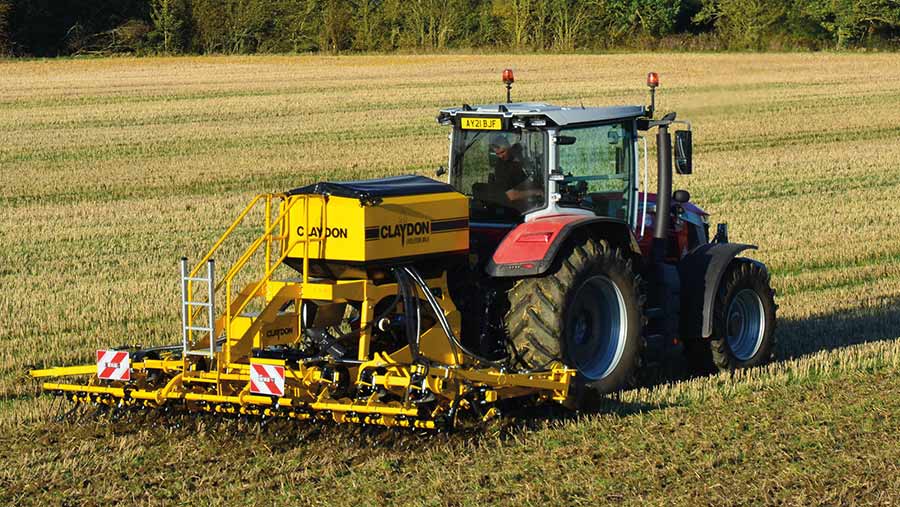
New Evolution drills from Claydon have bigger hoppers and easier depth adjustment than their Hybrid predecessors © Claydon
While the two-tine Opti-Till assembly remains unchanged, the redesigned drills that carry the Evolution name have bigger hoppers for increased sowing capacity per fill, easier seeding depth adjustments and a number of other detailed enhancements.
While the 4m, 6m and 8m trailed drills continue as before, all models from the 3m to 6m mounted, and the 3m trailed, now have the Evolution treatment.
Seed-only versions gain 160 litres of hopper capacity to 1,910 litres. The combi versions of the 3m, 4m rigid and 3m trailed have 2,700 litres for seed and fertiliser – a 600-litre increase – with a 50:50 split.
Seed depth adjustment is now controlled hydraulically and there is improved access to the metering unit for easier calibration.
Front-mounted discs for sowing into high-volume residues are also operated hydraulically from the tractor seat.
Quick-fit knock-on/knock-off options are available for the leading tine and also for the A-Share or low disturbance twin disc and tine options, which equip the drills for different sowing scenarios.
Dale
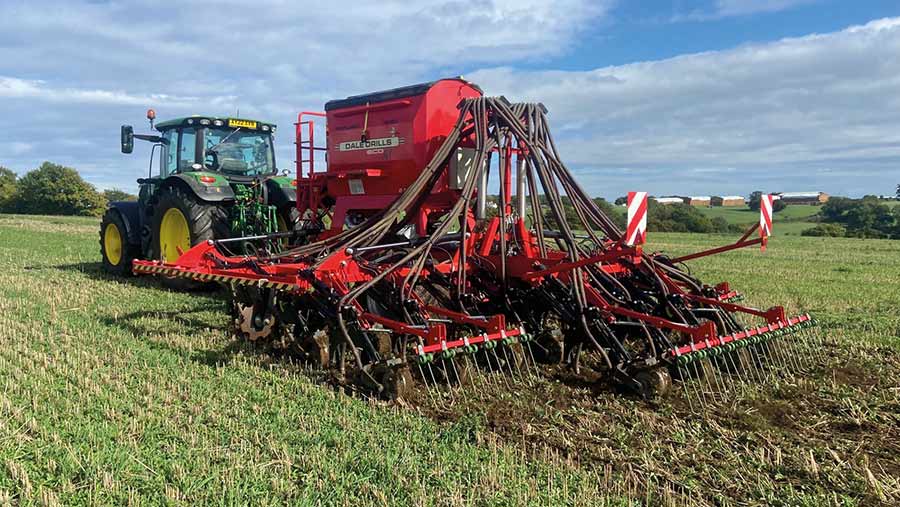
An 8m version joins existing sizes in the Dale MTD tractor-mounted drill range © Dale
Dale Drills is catering for growers wanting yet more sowing output by adding an 8m-wide version of the tractor-mounted MTD line, as well as a 13.5m version of the trailed Eco-Drill XL.
The MTD has four distinct rows of 12mm wide tungsten-tipped tines spaced 125mm or 166mm apart.
Their working depth is regulated by the four hydraulically adjusted frame-support wheels that also allow the wing sections to follow contours independently of the central section.
Seed is carried in a 1,200kg hopper mounted overhead or on the front of the tractor.
There is also a new 8m version of Dale’s Eco-Drill, which is produced in several trailed configurations.
The existing 8m L 8 has rear-mounted wheels with the hopper above them, whereas the new M 8 has wheels within the coulter frame, with the hopper to the front of the frame.
Dale’s new flagship 13.5m Eco-Drill uses the XL configuration, which mounts the hopper ahead of large transport wheels located within the coulter frame.
Horsch
At Horsch, the largest Sprinter 8 ST – the version with its hopper mounted on the main frame – has been dropped, but the SW seed cart version with rear-mounted seed coulters remains in the line-up.
With either configuration, the Sprinter design has three separate rows of tines (two on 12m) with Duett double-row wing points on a parallel linkage assembly with up to 285kg of pressure available from a coil spring on each.
Meanwhile, the Sprinter NT, with its chisel tine coulters mounted on rubber-cushioned trailing arms, is due for a change to a new model but no details are available as yet.
KRM Sola
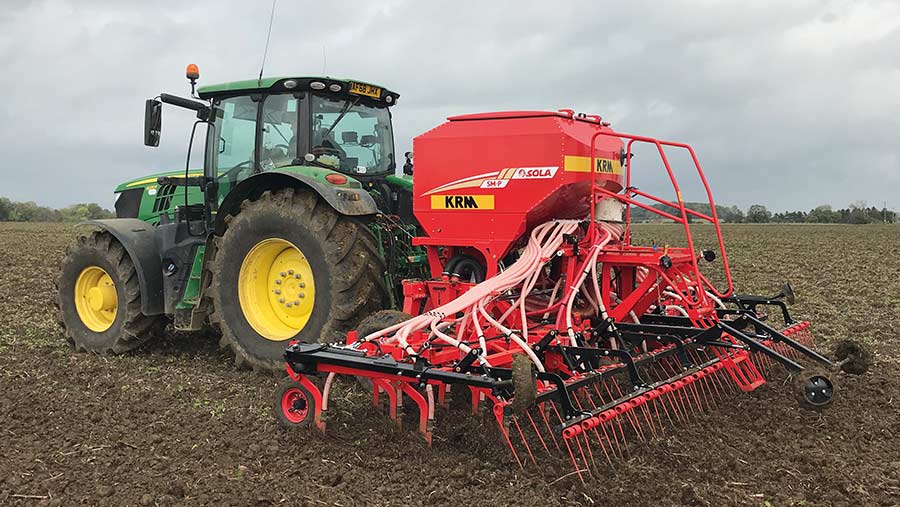
A new 6m configuration for KRM’s Soladrill established 24 rows, spaced 250mm apart © KRM
Another 6m configuration has joined the 4.8m, 29-row unit added last year to the Soladrill SM-P Elektra line-up.
With 24 rows spaced 250mm apart, the newcomer provides a wide-row alternative to the 37-row version that has the 160mm row spacing of all other models in the range.
The three-point linkage-mounted drill has rigid, coil-spring tensioned tines carrying narrow tungsten carbide points, with sowing depth regulated by ratchet-adjusted land wheels.
There are no pre-coulter options, but a two-row flexible tine harrow scuffles the surface as a follow-up process.
While similar to the Soladrill 1909 SM, the SM-P Elektra drills have a pressurised 2,000-litre hopper to ensure good seed distribution to the coulters via an Isobus-controlled metering unit.
Mzuri
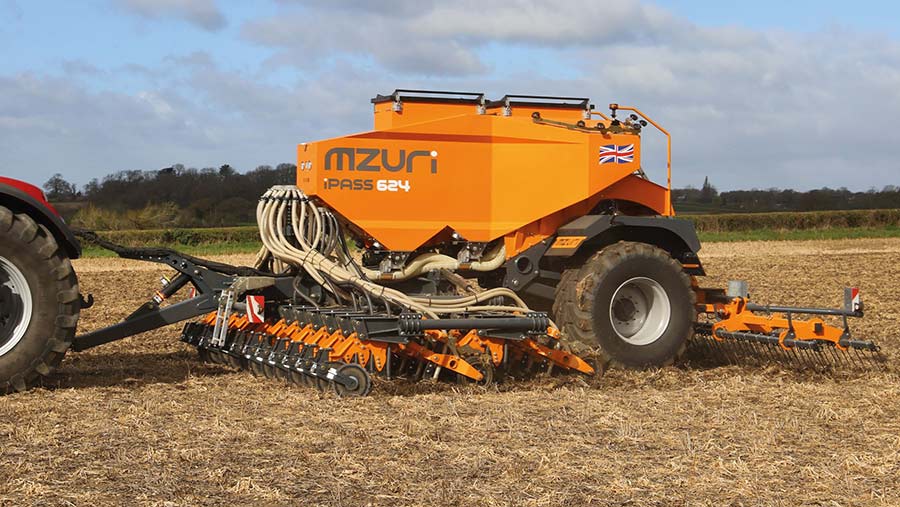
Same drill, new colour – the iPass is now Mzuri-branded and comes in three smaller sizes © Mzuri
Originally launched in light blue under the Izona brand name, the iPass drill is now incorporated into the Mzuri range alongside its Pro-Til counterpart – and with a handful of new sizes.
All are trailed with an unchanged format, which comprises very large rear-mounted transport wheels, a set of spring-loaded serrated discs to clear a path for fertiliser placement tines and the single- or two-row tine coulters.
The iPass 412 comes in at 4m sowing 12 rows at 333mm spacing, while the 416 covers the same width, establishing 16 rows at 250mm; the 4818 model completes the trio with 18 rows at 266mm, covering a working width of 4.8m.
Weaving
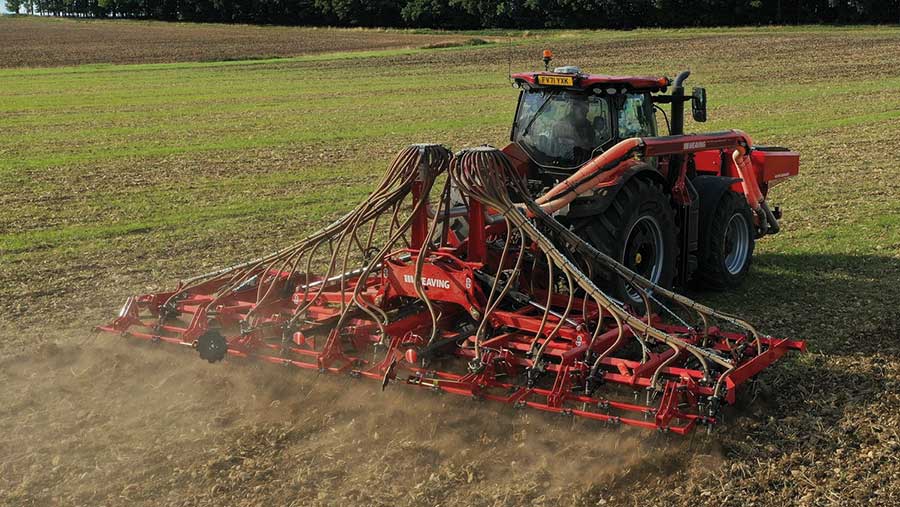
This 8m front tank version of the Weaving Sabre tine drill provides greater output © Weaving
An up-scaled version of the tractor-mounted Sabre Drill extends the range to 8m for increased productivity.
The current Sabre design incorporates a number of improvements over the previous generation.
These include an easier calibration process, relocated depth wheels to bring the drill’s weight forward, hydraulic instead of manual seed-depth adjustment, and a side-to-side rolling pivot for more precise contouring.
The sowing mechanism – a vertical steel tine clamped to the frame with rubber inserts – continues as before, with an adjustable stainless-steel tube to the rear.
Weaving’s new 8m rear-mounted Sabre Tine drill comes with the same 2,000-litre hopper as the 3m, 4.8m, 6m, 6.4m, and 7.2m versions, and like most of those is also available in a tractor-mounted front tank/rear coulter frame format.
It also now includes a 4.8m version with the 2,000-litre tank ,while the Sabre 8000 Front Tank gets the 2,400-litre tank of other drills built to this format – but uniquely in a seed and fertiliser configuration.

